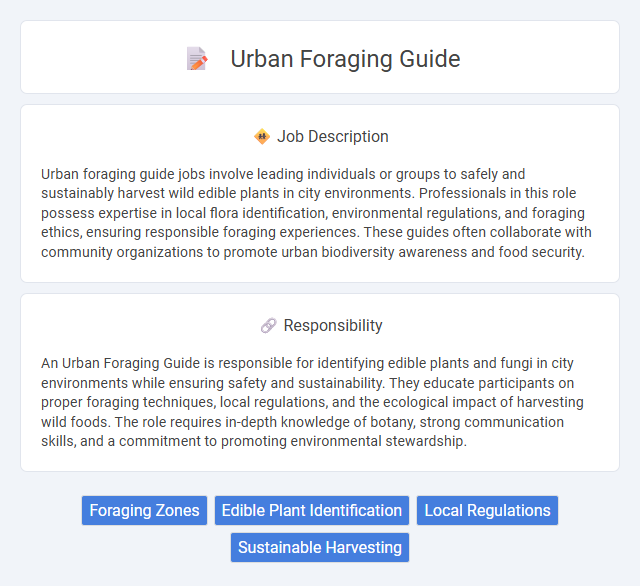
Urban foraging guide jobs involve leading individuals or groups to safely and sustainably harvest wild edible plants in city environments. Professionals in this role possess expertise in local flora identification, environmental regulations, and foraging ethics, ensuring responsible foraging experiences. These guides often collaborate with community organizations to promote urban biodiversity awareness and food security.
People who enjoy spending time outdoors and have a keen interest in nature or sustainable living will likely find urban foraging guide jobs suitable. Those with a strong knowledge of local plants and an ability to educate others about safe identification probably have an advantage in this role. Individuals who prefer structured office environments or have limited physical mobility might find this job less fitting.
Qualification
Urban foraging guide jobs require strong knowledge of local flora, including edible and toxic plant species. Candidates should possess certification in wild plant identification, experience in sustainable harvesting practices, and a background in ecology or botany. Excellent communication skills and a passion for environmental education enhance the effectiveness of guiding urban foraging tours.
Responsibility
An Urban Foraging Guide is responsible for identifying edible plants and fungi in city environments while ensuring safety and sustainability. They educate participants on proper foraging techniques, local regulations, and the ecological impact of harvesting wild foods. The role requires in-depth knowledge of botany, strong communication skills, and a commitment to promoting environmental stewardship.
Benefit
Urban foraging guide jobs likely offer benefits such as promoting sustainable living and enhancing community awareness about local edible plants. This role probably supports health by encouraging access to fresh, natural foods that reduce reliance on processed items. Engaging in urban foraging education may also boost outdoor activity and environmental stewardship.
Challenge
The Urban Foraging Guide role likely presents challenges related to identifying safe, edible plants in densely populated areas with potential pollution. Navigating local regulations and educating the public about sustainable harvesting practices may also be difficult. Adapting to seasonal changes and urban environments could further complicate the ability to consistently find and recommend viable foraging sites.
Career Advancement
Urban foraging guide roles offer unique opportunities for career advancement through specialization in plant identification, sustainable harvesting techniques, and environmental education. Professionals can enhance their expertise by obtaining certifications in permaculture, botany, or wilderness first aid, increasing their credibility and marketability. Gaining experience and expanding networks within environmental organizations and community outreach programs can lead to leadership positions or the development of branded urban foraging workshops and eco-tourism ventures.
Key Terms
Foraging Zones
Foraging zones are critical in urban foraging guide jobs, where experts identify safe, sustainable areas for harvesting edible plants within city environments. These zones often include parks, greenways, community gardens, and neglected lots rich in native and invasive species suitable for consumption. Guides evaluate soil quality, pollution levels, and plant diversity to ensure foragers gather nutritious, uncontaminated food sources while educating communities on ethical harvesting practices.
Edible Plant Identification
Urban foraging guides specialize in edible plant identification, teaching how to recognize safe, nutrient-rich wild greens, fruits, and herbs in city environments. Expertise in botany and local ecosystems ensures accurate differentiation between toxic and edible species, promoting sustainable harvesting practices. This role supports community health by encouraging foraging as a cost-effective, eco-friendly food source.
Local Regulations
Understanding local regulations is crucial for urban foraging guides to ensure sustainable and legal harvesting practices. Guides must be familiar with city ordinances, park rules, and property laws to avoid trespassing and protect endangered plant species. Adhering to municipal codes not only safeguards natural resources but also promotes responsible foraging within community guidelines.
Sustainable Harvesting
Urban foraging guides emphasize sustainable harvesting techniques to protect city ecosystems while providing accessible natural food sources. They teach foragers how to identify edible plants without damaging local flora, ensuring responsible collection practices that promote biodiversity. Through education on seasonal cycles and habitat preservation, urban foraging guides support environmental balance and community resilience.
 kuljobs.com
kuljobs.com